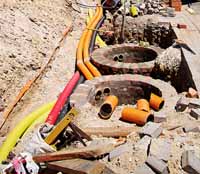NSW DET pitches fibre to NBN Co

The Department of Education and Training's chief information officer Stephen Wilson said he wants the department's 4500 kilometres of fibre to become part of the National Broadband Network (NBN).

(Preparing for 2010 image by
Warren Rohner, CC BY-SA 2.0)
"We've put a lot of effort into making sure that NBN Co and Senator Conroy's department understands the needs of schools and understands the desire of schools for NBN Co to work with Telstra to acquire assets so that they can actually be a part of the NBN," Wilson told ZDNet.com.au.
DET last year signed a $280 million deal with Telstra to deploy one of the country's largest privately-owned fibre networks. The build expanded DET's fibre footprint to 2400 of its properties across the state, which run between the sites, Telstra exchanges and DET's two datacentres.
The network is currently managed under a services deal with Telstra, which allows the DET to adjust network resources to meet demands at different points across it. Under DET's agreement with Telstra DET can offer speeds between 4Mbps to 100Mbps to schools.
"We have requested — as have everybody — that NBN Co takes account of that in their future plans," said Wilson. "We think it is in everyone's interests for that fibre to be non-contestable, and for us to be able to get wholesale services across that and for us to not ultimately have to just keep paying for the service."
Wilson said his fibre was an easy option for NBN Co's Mike Quigley to enable retail service providers to offer 1Gbps as he recently promised.
"We're looking at a guaranteed, reliable bandwidth on access links. We are going to have extremely high availability across the network; we are going to be making sure we align restoration and response times; we will have the potential to add redundancy where a customer requires it; and the ability to provide high speed symmetrical services," Quigley had said.
"The only reason [NBN Co] could do this is if they are going to buy this fibre or lay their own. And I don't see them laying fibre to 2400 schools. And I'm just one state," said Wilson, referring to Quigley's comments.
However, he said he wasn't sure how much it would be worth, nor whether NBN Co would go ahead with such a plan.
"I've just said please take it into account when you're designing it. And understand that schools aren't homes and we need high bandwidth and proper symmetrical fibre. And I'm comfortable that they're listening," said Wilson.